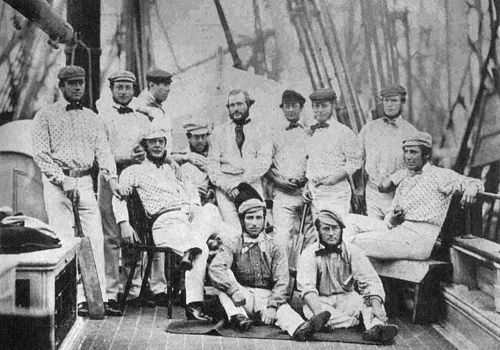William Caffyn

William "Billy" Caffyn (2 February 1828 in Reigate, Surrey – 28 August 1919 in Reigate) was a famous English cricketer who played for Surrey CCC and the All-England Eleven.
Surrey and All-England
Caffyn was a genuine all-rounder being a sound middle order right-handed batsman and a very effective rightarm medium fast roundarm bowler. He played a major part in the success of Surrey during the 1850s.
Caffyn's known first-class career spanned the 1849 to 1873 seasons. He took 602 wickets in 200 matches at an average of 13.47 runs each with a best analysis of 9/29. He took five wickets in an innings 49 times and 10 wickets in an innings 11 times. He scored 5885 runs at an average of 17.99 with a highest score of 103, making 2 centuries. He took 149 catches.

At the end of the 1859 English cricket season, Caffyn was one of the 12 players who took part in cricket's first-ever overseas tour when an England cricket team led by George Parr visited North America.
Australia
Caffyn was instrumental in the early development of Australian cricket and the establishment of Anglo-Australian competition. Known in England as the Surrey Pet, he came to Australia with a sponsored 1861/62 team which consisted of mainly Surrey cricketers, and again in 1864 after which he stayed on as coach of the Melbourne Cricket Club.
After a term in Melbourne, he moved to Sydney where he started a hairdressing business with his wife and coached at the Warwick Club. During this time he was closely associated with fellow ex-Surrey professional cricketer Charles Lawrence who coached at the Albert Cricket Club in Sydney.
In his book Seventy-one Not Out he wrote:
- The cricket out there in the ten years that have elapsed between the first visit of an English eleven and my leaving the country had made phenomenal improvement... It is a source of the greatest satisfaction to me that I have in some measure contributed to the successful state of things.
Caffyn has the distinction of bowling the first ball in the first match between a team from England and Australia at the Melbourne Cricket Ground which took place on New Year's Day in 1862 in which his visiting England XI were up against a Victorian XVIII.[1] He also played in the first Anglo-Australian first-class cricket match, played from 1 March 1862 and dubbed The World v Surrey, also at the MCG.[2]
The first Test match was not played until 15 years later in March 1877.
He returned to England in May 1871 and died at his home in Surrey at the age of 91. His house still remains at 'Sydneyville' 20 Parkgate Road, Reigate, unaltered from the time he resided there, the name a testament to his time in Australia.
His book
John Arlott rated highly his book of reminiscences Seventy-one Not out, edited by "Mid-On". Arlott wrote: "...despite its literary limitations, Seventy-one Not out is an essential book for anyone who wants to understand the history of cricket."[3]
See also
- History of Test cricket (to 1883)
Notes
- ↑ http://www.mcg.org.au/default.asp?pg=historydisplay&articleid=48
- ↑ Cricket Archive at cricketarchive.com
- ↑ Arlott on Cricket, edited by David Rayvern Allen, Fontana/Collins, 1985 edition, p180.
External sources
Further reading
- William Caffyn, Seventy-one not out: the reminiscences of William Caffyn, edited by "Mid-on" (Richard Daft), Blackwood, 1899
- H S Altham, A History of Cricket, Volume 1 (to 1914), George Allen & Unwin, 1926
- Derek Birley, A Social History of English Cricket, Aurum, 1999
- Rowland Bowen, Cricket: A History of its Growth and Development, Eyre & Spottiswoode, 1970
- Arthur Haygarth, Scores & Biographies, Volumes 3-9 (1841-1866), Lillywhite, 1862–1867
- John Major, More Than A Game, HarperCollins, 2007 – includes the famous 1859 touring team photo taken on board ship at Liverpool
- Chris Harte, A History of Australian Cricket, Andre Deutsch, 1993
- Jack Egan, The Story of Cricket in Australia, Macmillan Australia, 1987
| ||||||||||